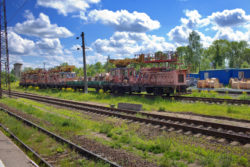Top Class Actions’s website and social media posts use affiliate links. If you make a purchase using such links, we may receive a commission, but it will not result in any additional charges to you. Please review our Affiliate Link Disclosure for more information.

Often, a former railway worker may develop cancer and attribute it to other factors such as family genetics without realizing that railroad cancer risk is known to be significantly greater than the risk for the general population.
Perhaps the biggest railroad cancer risk is the exposure to a chemical known as benzene. It is highly toxic and, although banned from consumer products nearly two decades ago, is still present in many railroad products.
This chemical is also produced when diesel fuel is burned. It was previously linked strictly to the development of lung cancer, but it is now known that benzene, which can be inhaled by way of fumes or even absorbed by our biggest defense—our skin—can be a factor in the development of a multitude of different cancers including:
- Blood Cancers such as Hodgkin’s Lymphoma, Non-Hodgkin’s Lymphoma, and Leukemia
- Respiratory Cancers such as Throat Cancer, Laryngeal Cancer, Lung Cancer, and Pleural Mesothelioma
- Renal Cancers such as Kidney Cancer, and Bladder Cancer
- Digestive Cancers such as Esophageal Cancer, Stomach Cancer, Colon Cancer, and Rectal Cancer
- Epithelial Cancers such as Multiple Myeloma
In addition to benzene, creosote is another highly toxic substance used to treat the wood that makes up railroad ties. Creosote has been linked to epithelial cancers and testicular cancers in males.
According to the Roswell Park Cancer Institute, railroad cancer risk is also increased by exposure to the solvents used in cleaning equipment, herbicides used around track routes to discourage weed growth, and lead paint used on railway equipment, bridges, and facilities.
In addition to benzene, fumes from welding and other toxins in diesel locomotive exhaust can add to railroad cancer risk too.
Finally, a very important consideration is asbestos exposure. Asbestos is found in brake shoes, pipe insulation, and electrical panels still in this present day. The Environmental Protection Agency (EPA) banned in 1973 most spray-applied asbestos insulation products, but a general 1989 EPA asbestos ban was overturned in 1991 by a federal court of appeals.
So the railroad cancer risk of developing mesothelioma after its average latency period of 10-30 years is still an active threat. Although exposures to airborne fibers have decreased enormously, exposure is still very much a reality.
Other products that could cause similar health problems are silica dust, which arises from the use of silica sand used to increase traction, and the dust from granite gravel which is deposited all around the bed of the railway.
No discussion of increased railroad cancer risk would be complete without taking into consideration additional health factors. Length of exposure to various toxins is extremely important in assessing the likelihood of disease development, but also lifestyle choices such as whether a worker smokes or not, whether they exercise or not, and whether they maintain a healthy weight or not, can all play a role.
Do YOU have a legal claim? Fill out the form on this page now for a free, immediate, and confidential case evaluation. The attorneys who work with Top Class Actions will contact you if you qualify to let you know if an individual railroad worker cancer lawsuit or class action lawsuit is best for you. [In general, railroad worker cancer lawsuits are filed individually by each plaintiff and are not class actions.] Hurry — statutes of limitations may apply.
ATTORNEY ADVERTISING
Top Class Actions is a Proud Member of the American Bar Association
LEGAL INFORMATION IS NOT LEGAL ADVICE
Top Class Actions Legal Statement
©2008 – 2024 Top Class Actions® LLC
Various Trademarks held by their respective owners
This website is not intended for viewing or usage by European Union citizens.
Get Help – It’s Free
Join a Free Railroad Worker Cancer Class Action Lawsuit Investigation
If you qualify, an attorney will contact you to discuss the details of your potential case at no charge to you.
Please Note: If you want to participate in this investigation, it is imperative that you reply to the law firm if they call or email you. Failing to do so may result in you not getting signed up as a client, if you qualify, or getting you dropped as a client.
E-mail any problems with this form to:
Questions@TopClassActions.com.
Oops! We could not locate your form.












